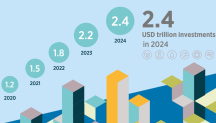

IRENA’s Five Actions for a Sustainable Energy Future
Newsletter
IRENA released a report this week that lays out a plan to limit global temperature rise. Rethinking Energy 2015 –Renewable Energy and Climate finds that reducing carbon emissions through the use of renewables and improving energy efficiency could mitigate the effects of climate change. Specifically, achieving a 36 per cent share of renewable energy, combined with implementing energy efficiency measures, would maintain global temperature rise to below 2oC.
“The energy sector accounts for more than two-thirds of global greenhouse gas emissions, and therefore must be the focus of climate action. Transitioning rapidly to a future fueled by renewable energy, accompanied by increasing energy efficiency, is the most effective way to limit global temperature rise. This transition is underway but it must be accelerated if we are to limit global temperature rise to two degrees Celsius.” – Adnan Z. Amin, IRENA Director-General
The report presents the following five actions that would further accelerate the deployment of renewable energy and secure a sustainable energy future:
- Strengthen the policy commitment to renewable energy. Enabling policies and regulatory frameworks create stable and predictable investment environments, help to overcome barriers, and ensure predictable revenue streams for projects. Setting renewable energy targets and formulating dedicated policies to implement them provides strong market signals, reflecting government commitment to the sector’s development.
- Mobilise investments in renewable energy. Public funding will remain an important catalyst and will need to increase, but the lion’s share of new investment in renewables will have to come from the private sector. To mobilise private investment, the strategy pursued must focus on risk mitigation instruments and structured finance tools to develop a strong pipeline of projects, and to unlock project financing and refinancing opportunities.
- Build institutional, technical and human capacity to support renewable energy deployment. From policy and regulatory design to project preparation, evaluation, development and financing, a wide array of skills needs to be built up in government ministries, financing institutions and regulatory agencies. And coordination between them is vital, in order to ensure, for instance, that physical infrastructure and complementary regulations, such as grid codes, keep pace with accelerating renewable energy development..
- Harness the cross-cutting impact of renewable energy on sustainable development. Achieving the Sustainable Development Goal (SDG) on energy will transform the energy system while helping meet other SDGs such as those on health, poverty alleviation, water and cities. Access to reliable, cost-effective and environmentally sustainable modern energy services can have a multiplier development impact. In particular, renewable energy solutions can expand electricity access, increase productivity, create jobs, improve water security and bolster poverty alleviation efforts. The wider sustainable development impact of renewable energy must be taken into account when strategies for the implementation of SDGs are developed.
- Enhance regional engagement and international cooperation on renewable energy development. Regional approaches and common initiatives can reduce costs, generate economies of scale, attract investments, boost financial capacity, stimulate cross-border trade and enable common progress in accelerating the deployment of renewable energy worldwide. To meet national goals and ambitions, countries would benefit from concerted action on renewables and climate mitigation that regional and international cooperation offers.

Rethinking Energy launch event on 22 November 2015 at IRENA Headquarters, Abu Dhabi, UAE. From left to right: Upendra Tripathy, Secretary, Minister of New and Renewable Energy, India; Conrod Hunte, Ambassador, Antigua and Barbuda; Martin Schoepe, Federal Ministry for Economic Affairs and Energy, Germany and IRENA Director-General Adnan Z. Amin.
“It is now not a question of if the world ultimately transitions to a renewable energy future, but rather whether it will do so quickly enough. At the upcoming climate talks in Paris, it will be up to countries to commit to strong targets, and in turn, give a strong political signal to catalyse further investments in renewable energy.” - Adnan Z. Amin, IRENA Director-General
REthinking Energy – Renewable Energy and Climate is the second edition of the series outlining progress in the transition to a sustainable energy future.
More photos from the launch event.
Renewable energy events at COP21: here




